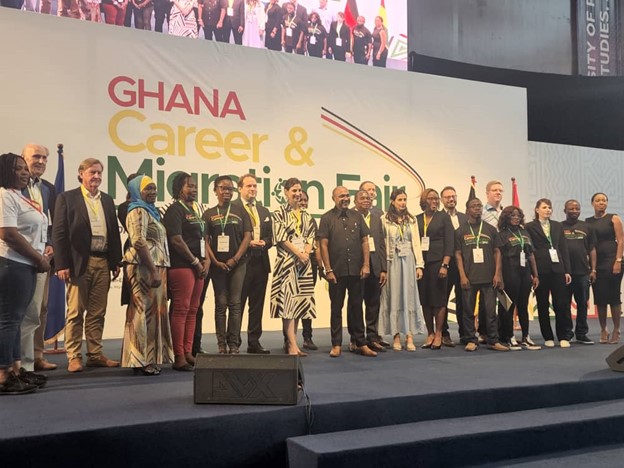Experts at the Ghana Career and Migration Fair have underscored the need for job seekers to acquire soft, green and digital skills as these are required to survive the ever-evolving global job market and bridge the unemployment gap.
They made this observation at a point when the African Development Bank has estimated that close to 100 million young people in Africa could be without jobs in the next 10 to 15 years, based on current labour force projections and trends.
With this at hand, the experts are confident that if job seekers are determined to match-up with industry demands in and with their peers elsewhere, they must acquire the skills beyond their degrees.
European Union (EU) Ambassador to Ghana, Irchad Razaaly, emphasised that: “Green and digital skills and technologies certainly possess transformative power in shaping the future job landscape”.
He also highlighted the essence of programmes that aim to equip job seekers with the skills necessary to thrive in the digital era, ensuring they are ready for today’s challenges and for the jobs of tomorrow.
“Additionally, the EU places special emphasis on promoting international mobility, encouraging the exchange of students and staff, and fostering research and innovation. These efforts are aimed at creating a workforce that is not only adaptable but at the forefront of technological and environmental advancements,” he said.
Deputy Head of Cooperation at the German Embassy, Ramona Simon added that Africa’s youthful population is estimated to more than double by 2050, hence the need to take interest in ensuring job security for socio-economic wellbeing.
She iterated that for a youthful population like Ghana’s, socio-political and economic stability are threatened if youth unemployment and underemployment are not addressed.
The main issues, she said, included the lack of a skilled workforce, work experience, and specific industry-required skills and competencies.
“How prosperous we will be, depends largely on employing our youths. It means we need to be determined and work hard to turn information and opportunities we get here today into business ideas for empowerment and career growth,” she added.
Other speakers who added their voices to the call advised that job seekers be open-minded to be able to embrace opportunities and also develop the right attitude to move into different areas and cultures.
They were also urged to take advantage of internship and volunteering opportunities while developing their critical thinking skills and investing in personal branding through training, continuous learning, and networking.
The Ghana Career and Migration Fair 2023 served as an engagement and orientation platform for job seekers and employers on current career prospects and skill demands in the local and international labour markets.
The objective of the fair is to empower participants to grasp the opportunities offered by the study in Europe programme and labour mobility to boost economic growth and development.
Skilled labour migration
In his address, Country Director of the Deutsche Gesellschaft für Internationale Zusammenarbeit (GIZ) Ghana, Dr. Dirk Aßmann, indicated that Germany and Europe are looking for skilled workers and this need provides opportunities for young ambitious Ghanaians to gain valuable experiences abroad and send remittances back home to support the local economy.
“Skilled labour migration is a win-win for the host country and the country of origin…When returning to Ghana, experiences gleaned in Europe will help to transfer knowledge across the economy and hence contribute to the development of Ghana as a whole,” he said.
For his part, Minister for Employment and Labour Relations, Ignatius Baffour Awuah stated that: “Government has been focusing on coordinating interventions to promote employment, and labour migration has emerged as an opportunity to support the government’s job agenda.
“However, to effectively benefit from labour migration, it must be well-managed. As such, the Ministry has developed the National Labor Migration Policy to ensure good governance in managing labour migration, safeguard the rights of migrant workers, and maximize development impacts”.
Ghana Career and Migration Fair
The annual fair, which is in its fifth year, presented the platform for over 2000 participants to explore career opportunities and educational prospects in Ghana, Germany, and the European Union and attracted about 60 firm.
During the fair, Ghanaian, German, and European employment stakeholders also explored opportunities for improving youth employment through technical and vocational skills training.
In addition, during various information sessions, organisers of the event exposed participants to opportunities for skilled labour migration, post-graduate educational prospects as well as technical and vocational training opportunities in Ghana, Germany, and the EU.
Since 2019, the Ghanaian-European Centre for Jobs, Migration and Development (GEC) has connected approximately 16,891 jobseekers to 413 employers and 1,855 job vacancies, with more than 1,258 vacancies filled. The annual event, one of GEC’s flagships, has continuously evolved over the years: physical, virtual due to the COVID-19 pandemic, hybrid and decentralized, in Kumasi, Sunyani and Tamale.










